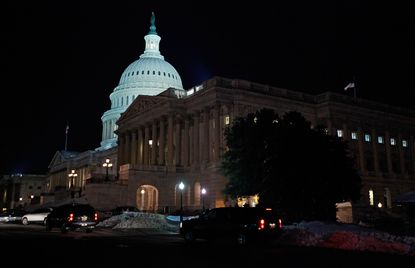Government shutdowns are the new normal
Unless our governing class metamorphoses into sane, decent human beings who take their jobs seriously, shutdowns are inevitable


Another new year, another The Good, the Bad, and the Ugly standoff involving two political parties and a president over government funding for programs supported by all of the players. Nobody shot.
Any thorough recounting of the negotiations through Sunday would sound like a description of what it's like to play Diplomacy with a roomful of stoned teenagers. Simply put, President Trump and the GOP and the Democrats all want the Deferred Action for Childhood Arrivals (DACA) — the program created by President Obama to allow immigrants brought to the United States as children to remain in this country — to be made permanent and to secure additional funding for the Children's Health Insurance Program. Which is why — I use that relational adverb in the loosest possible sense — they all agreed that we would have neither.
It would be easy to blame this mess on Trump, whose total lack of interest in policy certainly complicates the deal-making process. But shutdowns and brushes against the debt ceiling and reckless near-hurdles over the so-called "fiscal cliff" became a regular feature of American political life when our current president was still being paid to pretend to fire Gary Busey on network television. Democrats might look cynical today, but they are only repeating what Sen. Ted Cruz (R-Texas) did in 2013, when he decided that he would hold up all federal spending unless President Obama signed a budget that also repealed his signature piece of domestic legislation. It didn't hurt Cruz or his party then — indeed, he made millions fundraising off his ludicrous stunt — and it won't hurt Democrats in 2018 either.
Subscribe to The Week
Escape your echo chamber. Get the facts behind the news, plus analysis from multiple perspectives.

Sign up for The Week's Free Newsletters
From our morning news briefing to a weekly Good News Newsletter, get the best of The Week delivered directly to your inbox.
From our morning news briefing to a weekly Good News Newsletter, get the best of The Week delivered directly to your inbox.
Furloughing millions of employees and forcing members of the Armed Forces to serve without pay isn't cynicism. It's nihilism. It's the governing equivalent of refusing to deposit your paycheck until your account is overdrawn while arguing with your spouse about the order in which you're going to purchase all the things you both agree that you should buy. Unlike Wells Fargo, we aren't allowed to charge the Senate overdraft fees. Shutdowns happen because, whatever the consequences for the rest of us, for politicians they are absolutely cost-free.
Maybe that should change.
At least one elected official agrees. Sen. Michael Bennett (D-Colo.) introduced the “Shutdown Accountability Resolution” in 2015. This admirable piece of writing would, if adopted, force the Senate to convene at 8:00 a.m. the day after any federal agency finds itself without funding. Any members who are not present would be arrested by the sergeant-at-arms and debate would proceed for 12 hours daily until funding was secured.
The truth is, though, that even if Bennett's proposal were to win the support of his colleagues, which is supremely unlikely, this mandatory attendance fest would just take the place of the usual shutdown scenario. Chuck Schumer and Mitch McConnell would let it happen, then hold solemn and lachrymose press conferences in which they lament the unfortunate circumstances that have brought us to this moment. Maybe Cruz would make a show of letting himself get cuffed and dragged on to the Senate floor screaming "Don't taze me, bro!"
Politics in America is a genteel affair arranged largely to maximize the convenience and preening potential of those in office. Partisan paralysis is in the best interest of both parties. Senators can pretend to have existential disagreements for a few hours on a Friday afternoon and then spend the weekend watching football because they are not the ones who will be worrying about their checking account balances on Monday morning. They have never been more theoretically at odds with one another or more practically in agreement about what really matters. The threat of deportation is not looming over moderate Republicans who praise the president even while glibly admitting that for Trump the shutdown is a minor inconvenience whose significance does not extend much beyond necessitating a change in his vacation plans.
Forcing these people to do what they have been elected — and paid royally — to do is kindergarten stuff. What we need to do is make their lives at least slightly inconvenient. We should consider docking congressional pay by 2 percent for every day that a federal agency goes unfunded and slashing away at their retirement packages. There are all sorts of other ridiculous office-related perks that could be made to disappear, like the Capitol gym, which shouldn't exist anyway. Some sort of mechanism might even be established that makes it illegal to contribute campaign funds to any senator or congressman seated during a shutdown for at least one year. Imagine running for re-election with no money against an outsider with infinite screen time.
None of that is ever going to happen.
Government shutdowns are going to become normal. Barring the establishment of one-party Clintonist rule or some kind of Tea Party militia coup, they are in, fact, inevitable. They will remain so for the foreseeable future unless something even more unlikely than either of those two ridiculous scenarios comes to pass: Our entire governing class metamorphoses into sane, decent, practical human beings who take their political vocation seriously.
Sign up for Today's Best Articles in your inbox
A free daily email with the biggest news stories of the day – and the best features from TheWeek.com
Matthew Walther is a national correspondent at The Week. His work has also appeared in First Things, The Spectator of London, The Catholic Herald, National Review, and other publications. He is currently writing a biography of the Rev. Montague Summers. He is also a Robert Novak Journalism Fellow.
-
 US election: who the billionaires are backing
US election: who the billionaires are backingThe Explainer More have endorsed Kamala Harris than Donald Trump, but among the 'ultra-rich' the split is more even
By Harriet Marsden, The Week UK Published
-
 US election: where things stand with one week to go
US election: where things stand with one week to goThe Explainer Harris' lead in the polls has been narrowing in Trump's favour, but her campaign remains 'cautiously optimistic'
By Harriet Marsden, The Week UK Published
-
 Is Trump okay?
Is Trump okay?Today's Big Question Former president's mental fitness and alleged cognitive decline firmly back in the spotlight after 'bizarre' town hall event
By Harriet Marsden, The Week UK Published
-
 The life and times of Kamala Harris
The life and times of Kamala HarrisThe Explainer The vice-president is narrowly leading the race to become the next US president. How did she get to where she is now?
By The Week UK Published
-
 Will 'weirdly civil' VP debate move dial in US election?
Will 'weirdly civil' VP debate move dial in US election?Today's Big Question 'Diametrically opposed' candidates showed 'a lot of commonality' on some issues, but offered competing visions for America's future and democracy
By Harriet Marsden, The Week UK Published
-
 1 of 6 'Trump Train' drivers liable in Biden bus blockade
1 of 6 'Trump Train' drivers liable in Biden bus blockadeSpeed Read Only one of the accused was found liable in the case concerning the deliberate slowing of a 2020 Biden campaign bus
By Peter Weber, The Week US Published
-
 How could J.D. Vance impact the special relationship?
How could J.D. Vance impact the special relationship?Today's Big Question Trump's hawkish pick for VP said UK is the first 'truly Islamist country' with a nuclear weapon
By Harriet Marsden, The Week UK Published
-
 Biden, Trump urge calm after assassination attempt
Biden, Trump urge calm after assassination attemptSpeed Reads A 20-year-old gunman grazed Trump's ear and fatally shot a rally attendee on Saturday
By Peter Weber, The Week US Published


